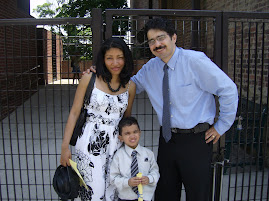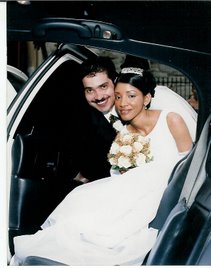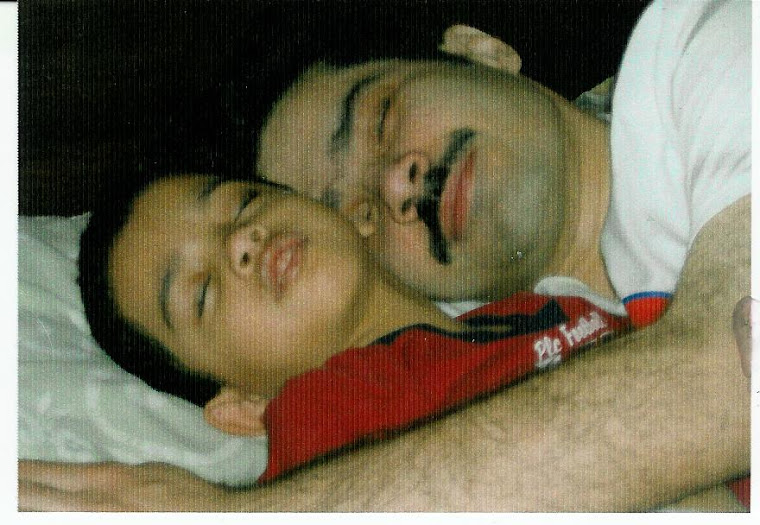

These editorals from the past two months caught my eye. reflections will follow next post.
What's to Discuss?
by Rev. Bob De Moor
The ethical position of the Christian Reformed Church on homosexuality was reaffirmed by the denomination's synod (annual leadership meeting) in 2002-2003:
homosexual orientation is a result of humanity's fallen condition and not the result of sinful choice(s) made by those who have this orientation;
homosexual actions are sinful, and a person who persists in them is subject to church discipline;
CRC members who have a homosexual orientation but do not engage in homosexual practices are eligible for church office, but those who engage in homosexual practices are not;
our congregations must show full acceptance to all our brothers and sisters who have a homosexual orientation, lovingly enfold them in the fellowship of believers, and support them with pastoral care in living out God’s will for their lives.
On that last point, synod admitted that our congregations have failed miserably in fulfilling our responsibility to those among us who are homosexual. I've asked around. We've made precious little progress on that since Synod 2003 made that admission. Congregations, de facto, use a "don't ask, don't tell" policy that continues to marginalize those who are homosexual and makes them feel anything but welcome in our midst.
This "ostrich in the sand" approach isn't serving any of us well. I know of a number of congregations who have members living in committed homosexual relationships and in which church leaders are not actively applying church discipline. Why not? It's not because those leaders are lazy or uncaring but because present CRC policy doesn't help them deal pastorally with same-sex couples who live in a committed relationship and who show strong faith, Christian maturity, and a sincere desire to continue within the fellowship of believers.
Perhaps more common is the ongoing exodus of those who must choose between a lifelong same-sex partnership and membership in the CRC. They quietly leave our congregations to worship elsewhere.
Rev. Mike Veenema's IMHO on page 8 reveals the deep personal pain that people suffer because of this present reality in the CRC. Perhaps we need to maintain our official position with respect to homosexual practice but build on it and train local church councils how to implement it properly. Perhaps we need to modify it in some way to address differently those who are in committed same-sex relationships. In either case, we need to converse and deal openly with each other in seeking God’s will and God's way in this very significant pastoral matter—without the chilling effect of ecclesiastical censure.
It's time to take another look at the best way for us to proceed together in faith, love, and unity.
Why risk discussing this again, seeing the pain it has brought in other denominations? Because, as Pastor Mike's IMHO shows, the pain is already here. It's quietly borne by those who are silenced and excluded and by their loved ones. For their sake and all of ours, let's heed Paul's urging to "speak the truth in love" so that we will "grow up in every way into him who is the head, into Christ" (Eph. 4:15, NRSV).
Let's talk.
We Can Be Sure and Wrong, Right?
by Rev. Bob De Moor
With great interest I’ve followed our discussions on homosexuality in The Banner, on the Banner website, and on “Bob’s Blog,” also on the Banner website (www.thebanner.org).
Two things strike me. The first is that these conversations are open, respectful, and keenly concerned about being true to Scripture. That’s hopeful. The second is that so many of us are so sure about stuff—even though what we’re sure of stands diametrically opposed to what others are sure of.
This is what many respondents are sure of:
• The Bible clearly forbids all homosexual practices.
• The Bible does not forbid all homosexual practices.
• The church must discipline those who are in same-sex relationships.
• The church must not discipline those who are in same-sex relationships.
• If parents love their homosexual children, they will support them if they choose a same-sex partner.
• If parents love their homosexual children, they will warn their children away from same-sex relationships.
Interestingly, respondents on both sides of the debate agree that they’re sure the Banner editor raised this issue because he’s secretly hoping that the present church policy will be liberalized. But the one side is sure that’s a good thing, the other that it’s a bad thing.
(For the record, if you refer back to the March issue of The Banner you’ll see that the editor is not at all sure of what’s needed, just that there are a lot of people hurting out there and that we either need to help our churches better implement the policy we have, or we need to adjust it in some way to meet the challenge placed before us by Synods 2002 and 2003 to provide better pastoral care.)
So what might get our conversation unstuck? What might get us beyond our conundrum?
I see hope in the fact that we’re all sure we must do what Scripture would have us do—both in terms of the policy we adopt and how we implement that policy in extending loving acceptance and pastoral care to all our members. Might it help our conversation forward if we parked our certainties at the door and humbly asked our best minds to do some fresh, serious Bible study that is also informed by the latest scientific research on the subject (since Reformed folks do need to consult creation revelation as well)? A new synodical study committee might help us to do that, and, further, to advise our churches on how we are to implement CRC policy (changed or unchanged) in an appropriate manner.
Sometimes the more we study, the less we know we really know. That’s not a bad thing because it opens us up to the Holy Spirit’s leading as we pray, learn, dialogue, and continue to live together in love.
I’m sure that the same applies to the issue at hand. And, yeah, I could be wrong
by Rev. Bob De Moor
The ethical position of the Christian Reformed Church on homosexuality was reaffirmed by the denomination's synod (annual leadership meeting) in 2002-2003:
homosexual orientation is a result of humanity's fallen condition and not the result of sinful choice(s) made by those who have this orientation;
homosexual actions are sinful, and a person who persists in them is subject to church discipline;
CRC members who have a homosexual orientation but do not engage in homosexual practices are eligible for church office, but those who engage in homosexual practices are not;
our congregations must show full acceptance to all our brothers and sisters who have a homosexual orientation, lovingly enfold them in the fellowship of believers, and support them with pastoral care in living out God’s will for their lives.
On that last point, synod admitted that our congregations have failed miserably in fulfilling our responsibility to those among us who are homosexual. I've asked around. We've made precious little progress on that since Synod 2003 made that admission. Congregations, de facto, use a "don't ask, don't tell" policy that continues to marginalize those who are homosexual and makes them feel anything but welcome in our midst.
This "ostrich in the sand" approach isn't serving any of us well. I know of a number of congregations who have members living in committed homosexual relationships and in which church leaders are not actively applying church discipline. Why not? It's not because those leaders are lazy or uncaring but because present CRC policy doesn't help them deal pastorally with same-sex couples who live in a committed relationship and who show strong faith, Christian maturity, and a sincere desire to continue within the fellowship of believers.
Perhaps more common is the ongoing exodus of those who must choose between a lifelong same-sex partnership and membership in the CRC. They quietly leave our congregations to worship elsewhere.
Rev. Mike Veenema's IMHO on page 8 reveals the deep personal pain that people suffer because of this present reality in the CRC. Perhaps we need to maintain our official position with respect to homosexual practice but build on it and train local church councils how to implement it properly. Perhaps we need to modify it in some way to address differently those who are in committed same-sex relationships. In either case, we need to converse and deal openly with each other in seeking God’s will and God's way in this very significant pastoral matter—without the chilling effect of ecclesiastical censure.
It's time to take another look at the best way for us to proceed together in faith, love, and unity.
Why risk discussing this again, seeing the pain it has brought in other denominations? Because, as Pastor Mike's IMHO shows, the pain is already here. It's quietly borne by those who are silenced and excluded and by their loved ones. For their sake and all of ours, let's heed Paul's urging to "speak the truth in love" so that we will "grow up in every way into him who is the head, into Christ" (Eph. 4:15, NRSV).
Let's talk.
We Can Be Sure and Wrong, Right?
by Rev. Bob De Moor
With great interest I’ve followed our discussions on homosexuality in The Banner, on the Banner website, and on “Bob’s Blog,” also on the Banner website (www.thebanner.org).
Two things strike me. The first is that these conversations are open, respectful, and keenly concerned about being true to Scripture. That’s hopeful. The second is that so many of us are so sure about stuff—even though what we’re sure of stands diametrically opposed to what others are sure of.
This is what many respondents are sure of:
• The Bible clearly forbids all homosexual practices.
• The Bible does not forbid all homosexual practices.
• The church must discipline those who are in same-sex relationships.
• The church must not discipline those who are in same-sex relationships.
• If parents love their homosexual children, they will support them if they choose a same-sex partner.
• If parents love their homosexual children, they will warn their children away from same-sex relationships.
Interestingly, respondents on both sides of the debate agree that they’re sure the Banner editor raised this issue because he’s secretly hoping that the present church policy will be liberalized. But the one side is sure that’s a good thing, the other that it’s a bad thing.
(For the record, if you refer back to the March issue of The Banner you’ll see that the editor is not at all sure of what’s needed, just that there are a lot of people hurting out there and that we either need to help our churches better implement the policy we have, or we need to adjust it in some way to meet the challenge placed before us by Synods 2002 and 2003 to provide better pastoral care.)
So what might get our conversation unstuck? What might get us beyond our conundrum?
I see hope in the fact that we’re all sure we must do what Scripture would have us do—both in terms of the policy we adopt and how we implement that policy in extending loving acceptance and pastoral care to all our members. Might it help our conversation forward if we parked our certainties at the door and humbly asked our best minds to do some fresh, serious Bible study that is also informed by the latest scientific research on the subject (since Reformed folks do need to consult creation revelation as well)? A new synodical study committee might help us to do that, and, further, to advise our churches on how we are to implement CRC policy (changed or unchanged) in an appropriate manner.
Sometimes the more we study, the less we know we really know. That’s not a bad thing because it opens us up to the Holy Spirit’s leading as we pray, learn, dialogue, and continue to live together in love.
I’m sure that the same applies to the issue at hand. And, yeah, I could be wrong










No comments:
Post a Comment